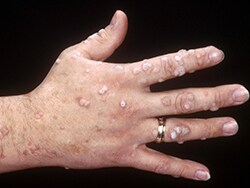We have all seen them—what I term "Hydra warts." Like the mythical Greek nine-headed serpent, these things can be impossible to kill. Cut off one wart, and two grow in its place. What is the mechanism for this maddening resilience?
With a prevalence > 30% in the general population and > 75% in immunocompromised individuals, warts are benign but bothersome and are one of the most common dermatologic complaints. Although the majority of your patients can deal with them, they can cause significant social and emotional distress if widespread or affecting cosmetically sensitive areas. Plantar variants are often painful and interfere with walking and running.
All warts are caused by human papillomavirus (HPV). However, the oncogenic strains (types 16, 18, 31, and 33) are implicated in cervical and squamous cell carcinoma. So we can't afford to ignore them.

Most cutaneous warts can be cleared using destructive methods or off-label topical (eg, imiquimod, squaric acid) or injected (Candida, MMR, or PPD antigens) immune stimulants, which activate cell-mediated immunity against HPV.
In some cases, HPV-infected keratinocytes seem able to evade a host's immune system in a manner reminiscent of cancer cells. One crucial mechanism by which cancer cells evade immune detection is by inhibiting cytotoxic T-lymphocyte activation via the programmed cell death ligand 1 (PD-L1)-programmed cell death 1 (PD-1) pathway.
Could a similar mechanism explain resistant warts that just won't go away? And can that information offer a potential new treatment option? A recent study analyzed 44 biopsy specimens from cutaneous warts to look for PD-L1 and PD-1 expression to look for this mechanism. Normal surrounding skin was used as an internal control for negative PD-L1 and PD-1 staining. PD-L1 expression was found in 40% of common warts and 50% of myrmecia (plantar warts). This was mostly confined to the lower layers of the epidermis, where HPV reservoirs are concentrated.
Medscape Dermatology © 2020 WebMD, LLC
Any views expressed above are the author's own and do not necessarily reflect the views of WebMD or Medscape.
Cite this: Graeme M. Lipper. The Nine-Headed Monster: Recalcitrant Warts - Medscape - Feb 12, 2020.







Comments